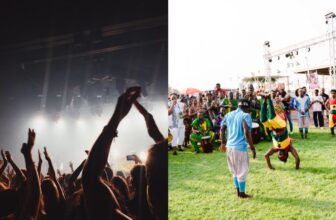How Long Does It Take To Make An Album?

In extremis, making an album can take anywhere between 24 hours and more than a decade. On average, though, albums take anywhere between one and six months to complete (as far as the music is concerned). The whole process of releasing an album is more demanding and usually takes one to three years.
There’s an old music anecdote involving Bob Dylan and Leonard Cohen. Dylan asks Cohen how long it took him to write “Hallelujah,” to which Cohen replies “five years.” Then, he asks Dylan how long it took him to write “Like a Rolling Stone,” to which Dylan replies “five minutes.”
While possibly fictional, this short story goes to show that it’s impossible to put a definitive number on how long it takes to complete a work of art. Both “Hallelujah” and “Like a Rolling Stone” are among the best songs of all time, and nobody seems to care about how long it took for Cohen and Dylan to write them.
Albums are the same: they matter because of how good they are, not because of how long it took artists to make them. So, how can we provide a concise answer to the question “How long does it take to make an album?”
The key is to understand what it takes to complete an album, how fast can artists make an album, and how periodically major and independent artists release new albums.
Contents
What does it take to complete an album?
There are four main stages involved in the completion of an album: the composition stage, the recording stage, the mixing and mastering stage, and the promotion stage. Generally, the release of an album is followed by an extended period of press appearances and touring.
1. The composition stage
Composing an album requires creating the songs or structural guidelines necessary for a music project to enter the studio knowing it can record a full album. The composition stage of an album can be as short as a jam session and as long as a lifetime.
Some albums are composed so fast that they end up being de-facto composed in the studio. That happens a lot in music genres that include improvisation, such as jazz and experimental music.
Others take much longer. It’s common for some artists to work on their songs for years before feeling like they’re ready to go to the studio, especially if they’re composing their debut album.
2. The recording stage
Recording an album requires capturing all the elements that make up the songs in the album in a studio environment (whether it’s a professional studio or a home studio). Generally, the recording stage of an album requires a financial investment and is for that reason limited to a few days or weeks.
There are, of course, exceptions. Established artists are lucky to have unlimited access to professional studios, and bedroom musicians don’t need to pay to record an album while at home. For the most part, however, artists record albums by paying for studio time and need to act as fast as their budget allows them to.
3. The mixing and mastering stage
Mixing and mastering an album requires tweaking the tracks recorded in the studio so they fit a commercial standard. Mixing is about balancing the different tracks in a song, while mastering is about ensuring that each track is suited to play on radio stations, music-streaming websites, and so forth. The mixing and mastering stage tends to take less than a month.
The mixing and mastering stage is usually short because most artists rely on the services of professional audio engineers to mix and master their albums. These professionals are highly technical, generally experienced, and normally accustomed to working with deadlines, so they can deliver results quickly.
4. The promotion stage
Promoting an album requires doing whatever it takes for an already-complete album to reach as many listeners as possible. Promoting an album is an evergoing process, meaning artists are basically promoting their latest album until they release a new one.
The time it takes to create the resources needed to promote an album varies extensively according to how much time and money artists/record labels invest in the promotion of an album.
Generally, such resources include:
- A press release announcing the artist’s new album.
- A complete artwork for the album.
- A physical edition of the album (vinyl, CD, and so forth).
- A music video for the album’s first single.
- A live tour.
- A press-appearance schedule.
- Merchandising and other promotional objects, tools, or events.
How fast can artists make an album?
The Guinness World Record for the world’s fastest album belongs to Jack White, who recorded, pressed, and published the vinyl record for “Lazaretto” in less than four hours. It’s worth noting, however, that the songs contained in the album were composed beforehand.
If we include the composition stage in the making of an album, we can find examples of artists who have completed an album in one day. It’s the case of the YouTubers Rob Scallon and Andrew Huang, who wrote and recorded a full album during a 10-hour studio session:
Scallon and Huang’s album, however, is more of an experience and less of a credible full-length release. The same goes for White’s “Lazaretto,” as one could say that while breaking the record took him less than four hours, preparing to do so (and crafting the actual album) must’ve taken him a lot longer.
Realistically, artists can make a typical, commercially-released album from start to finish in one to two weeks, and that’s if they’re pushing themselves to the limit and working around the clock. This is a conceivable scenario, for sure—but honestly, I’ve never heard of anyone who’s made a quality album in such a short period outside of genres such as jazz and experimental music.
The thing about making an album (and a good album in particular) is that it can be an utterly painful experience. It’s not just about going through every stage of the process. It’s also about self-analysis, obsessing over little details, desperately trying to find new ways of making the music more interesting, and sometimes even starting anew because the album isn’t working out the way you wanted it to!
Take My Bloody Valentine’s “Loveless,” for instance. The album is considered to be a timeless masterpiece, but the process of making it was so desperately agonizing that one of the record label’s executives even had a nervous breakdown! Initially, everybody thought the album would take five days of studio time to complete. In the end, the recording process alone lasted two years and cost more than $500K – you can read more about it here.
That’s not to say that time-and-money-spent-making-an-album equals quality. On the other side of the spectrum, the ever-delayed Guns N’ Roses record “Chinese Democracy” failed to impress both fans and critics despite taking 11 years to complete and costing a staggering $14 million.
How periodically do artists release new albums?
As a rule of thumb, major commercial artists wait anywhere between one and three years before releasing a new album. In the independent music scene, however, there are some examples of highly-prolific artists that release multiple albums per year without sacrificing quality.
Pressured by record labels and desperate to maintain their huge fanbase, major commercial artists don’t usually wait for more than three years to put a new album out. The discographies of Beyoncé and The Weeknd fit the norm, but there are many other mainstream examples.
In the much freer indie scene, acts such as King Gizzard & The Lizard Wizard and death’s dynamic shroud have a knack for releasing multiple albums per year without compromising on their quality. The Aussie rockers King Gizzard & The Lizard Wizard released six albums in 2017, while the vaporware icons death’s dynamic shroud made a whopping 11 albums in 2014 alone.
Producing quality music can be more time-consuming for others. Daft Punk’s masterpiece “Random Access Memories” was released eight years after “Human After All,” while D’Angelo’s “Black Messiah,” the follow-up to 2000’s “Voodoo,” only came out in 2014.
Conclusion
The time it takes to complete something is almost always relative, but it’s especially hard to pin down when it comes to works of art. Yes, making an album can last anywhere between 24 hours and multiple years, but I’d recommend against trying to make an album too fast (and overlooking quality) and too slowly (and obsessing over unimportant details).
Every musician has his or her modus operandi, and each should take whatever time is necessary to come up with a new release. So, how long does it take to make an album? Ideally, the exact same time it takes for an album to sound good.





